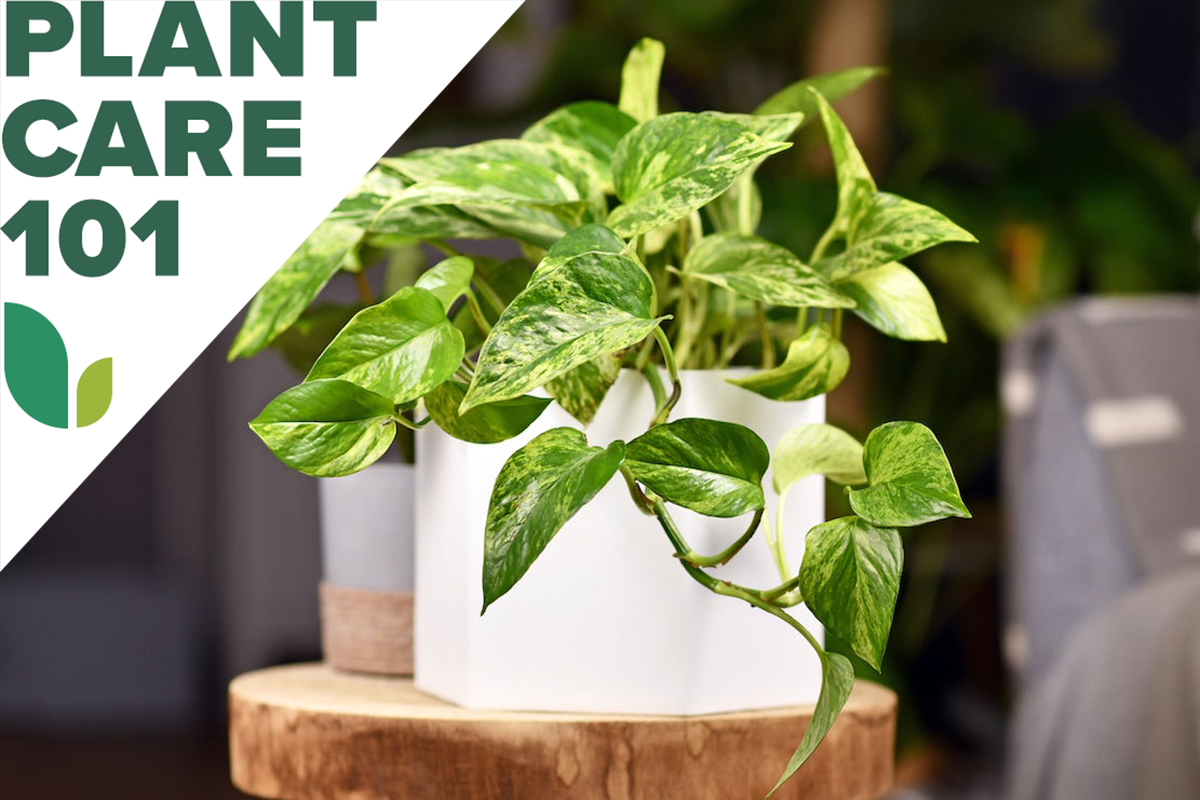

We may earn revenue from the products available on this page and participate in affiliate programs. Learn More ›
Originating in forests of Southeast Asia, pothos is a popular houseplant that’s super easy to grow, and tolerates a wide range of sunlight, moisture, temperature, and humidity conditions. It works as a trailing plant, climber, or mass of mounding foliage, depending on the way it is trained. And there are lots of colorful pothos varieties from which to choose, making it a fun plant for collectors.
Another upside is that pothos plants are relatively fast growers and simple to propagate. When a pothos is growing well, you can share it easily with other plant lovers or create new baby pothos plants for yourself. Read on to learn the easy-care techniques of growing and propagating pothos.
Pothos Plant Care at a Glance
Common name: Pothos, Devil’s Ivy
Scientific name: Epipremnum aureum
Plant type: Vine
Soil: Coarse, well draining
Light: Medium to bright
Water: Low to medium
Food: Feed monthly with general-purpose 20-20-20 plant food
Temperature and humidity: 60 to 90 degrees Fahrenheit and moderate humidity
Propagation: Stem cuttings
Safety: Keep away from pets and toddlers
Mature size: 20 to 40 feet long, 3 to 6 feet wide
How to Care for Pothos Plants
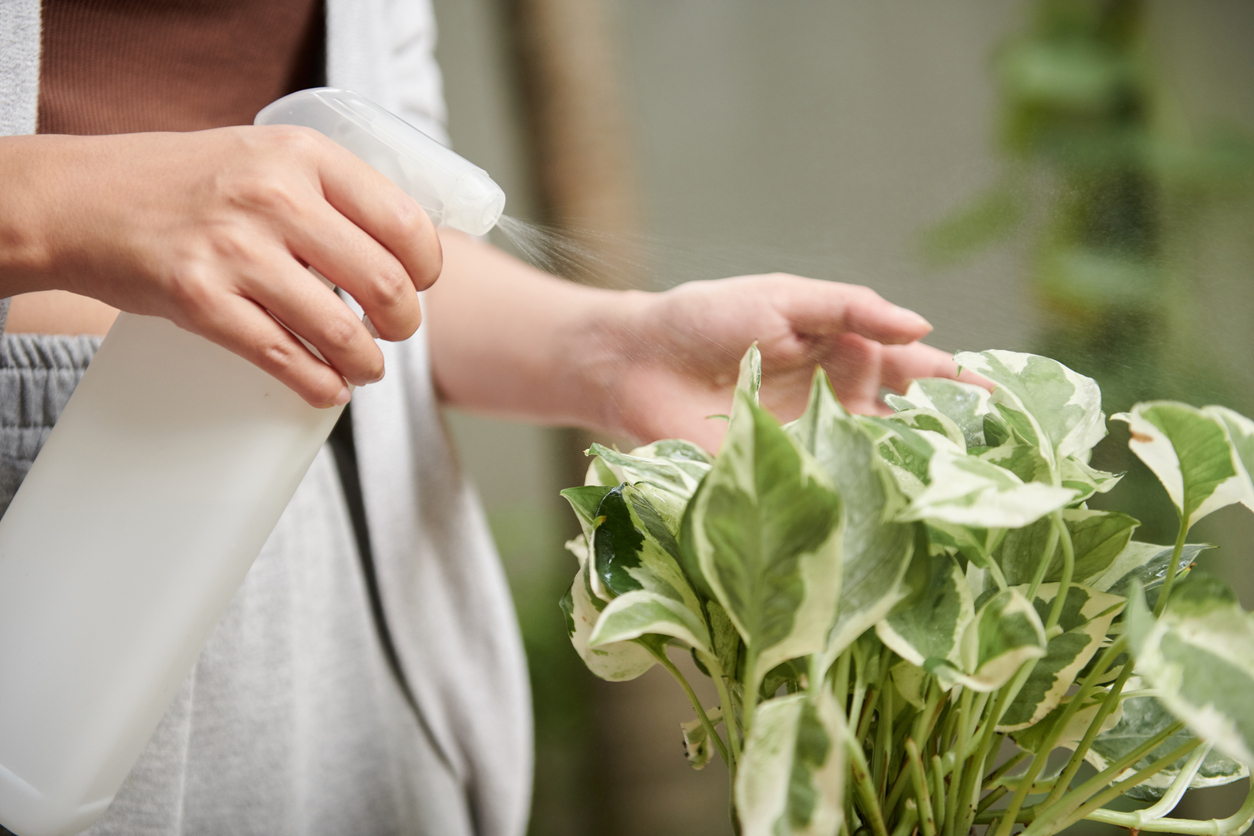
Pothos plants also are not picky about soil. When pothos grows as an indoor plant, it tolerates a wide range of sunlight, moisture, and temperatures, so this easy-care plant can add indoor greenery with minimal effort. However, some of the variegated forms, like golden pothos, need a bit more light to maintain their best coloration.
Select Soil for Pothos Plants
Choose a potting mix with a good amount of perlite and composted forest products for added drainage. Too much peat moss might retain excessive amounts of moisture, which can cause root rot.
Pothos can also grow in a vase of water. Simply take cuttings from the tips of longer vines, snipping them off just above a node, or leaf junction. Strip off the lower two or three leaves and insert them into a vase filled with fresh water. Change the water two or three times per week to prevent algae buildup.
RELATED: Pothos Plant Care
Choose the Right Light
The ideal lighting for all pothos varieties is bright, indirect sunlight. A room with south-facing windows is perfect. This bright light will allow the color to reach its most vibrant level, which is especially important for variegated pothos.
That said, pothos plants can still grow well even in low light. But under low-light conditions, variegation tends to revert back to solid green. If lighting is severely lacking, pothos leaves might drop off.
Water Pothos Plants
Pothos plants growing in potting soil need to dry out between waterings. Allow the soil to crust over slightly before watering. When it’s time to water pothos, simply use a watering can to give it a drink, or immerse the pot in a bucket of water to thoroughly saturate the soil.
However, in either case, if the pot is too large, the soil might retain water for too long, which could lead to root rot.
RELATED: 14 Houseplants That Grow in Water, So You Can Ditch the Dirt
Fertilize Your Pothos Plants
Apply 20-20-20 fertilizer monthly, according to the fertilizer label instructions for the container size. Liquid, granular, slow-release, and organic fertilizers all work well for pothos. Potting soil provides an initial feeding, but it will need to be supplemented with additional nutrients after about a month.
For a more consistent supply of nutrients, consider fertilizing more frequently. To do so, avoid overfertilizing by cutting back the application rate accordingly. If you prefer to water weekly with a liquid fertilizer, for instance, divide the monthly application rate by four.
Set the Temperature and Humidity
Pothos grow well between 65 and 75 degrees Fahrenheit with high humidity. Pothos should never be left outdoors or in an unheated room where the temperature drops below 55 degrees. High outdoor summer temperatures are generally fine, as long as the pothos plant is not in direct sunlight.
In winter, the humidity in a heated home typically drops, so pothos plants might develop brown leaf tips. Elevate the humidity around the plant by placing it on a tray filled with pea gravel and water, or mist the plant with a spray bottle daily.
RELATED: 12 Plants You Can Grow Successfully in the Shower
Prune Your Pothos Plant
Like other aspects of pothos plant care, pruning is easy. The following steps for how to prune pothos can help control your pothos plant’s growth, remove dead leaves, or get rid of any leggy vines.
- Use clean, sharp shears or scissors.
- Cut the vine about ¼ inch above a leaf node.
- If the cutting is healthy, you can stick it in a glass of water to create a new pothos plant.
How to Repot Pothos
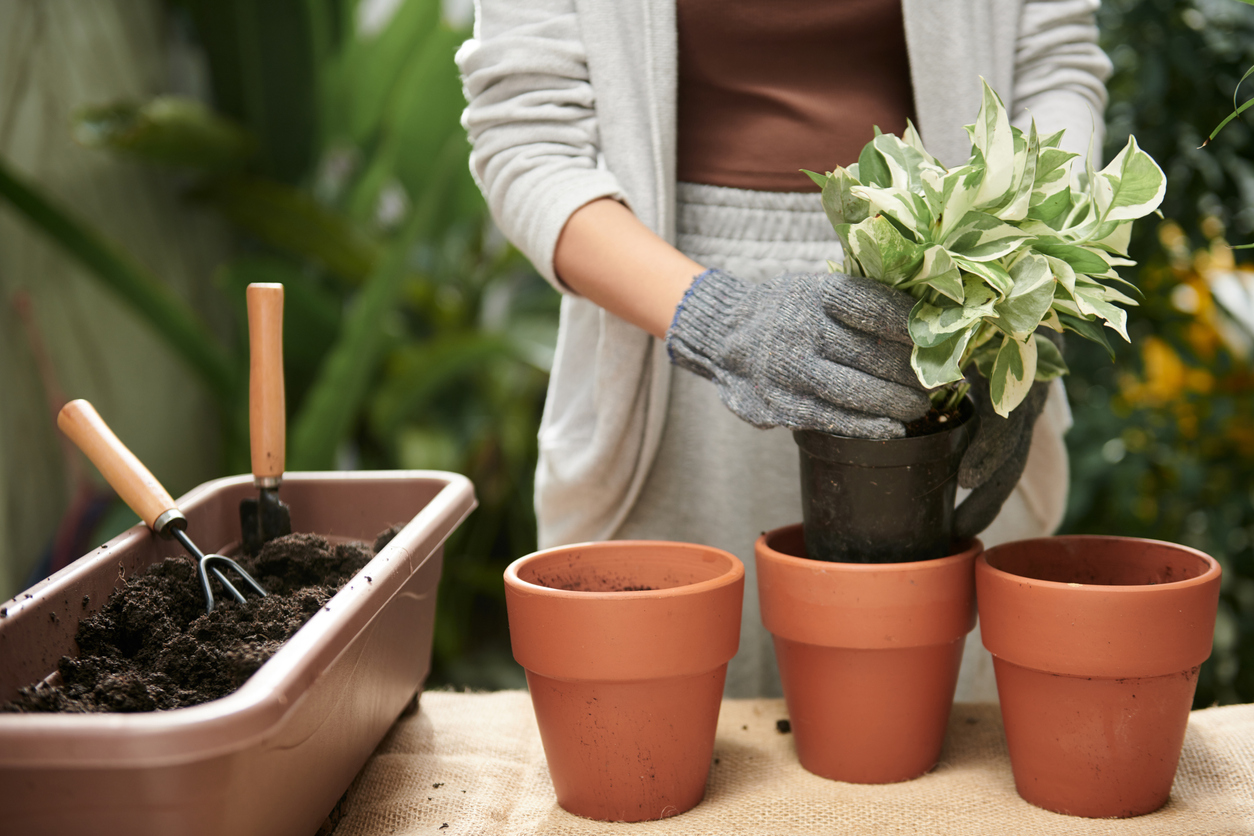
When repotting a pothos plant, the new pot should be no more than 2 inches larger than the root ball, otherwise the plant will be susceptible to root rot. To repot a pothos:
- Water the pothos to make removal easier.
- Choose a pot with drainage that measures 1 to 2 inches larger than the existing pot.
- Fill the new pot about ⅓ full with potting soil.
- Tip the existing pot to the side, gently grab the pothos by the base, and carefully wiggle it out, tapping the bottom of the pot to help loosen it.
- Place the pothos in the new pot.
- Backfill the new pot with soil until it completely covers the root ball.
- Water the plant until water drains out the bottom of the pot.
RELATED: 12 Houseplants That Collect the Most Dust—and Why That’s a Good Thing
How to Propagate Pothos Plants
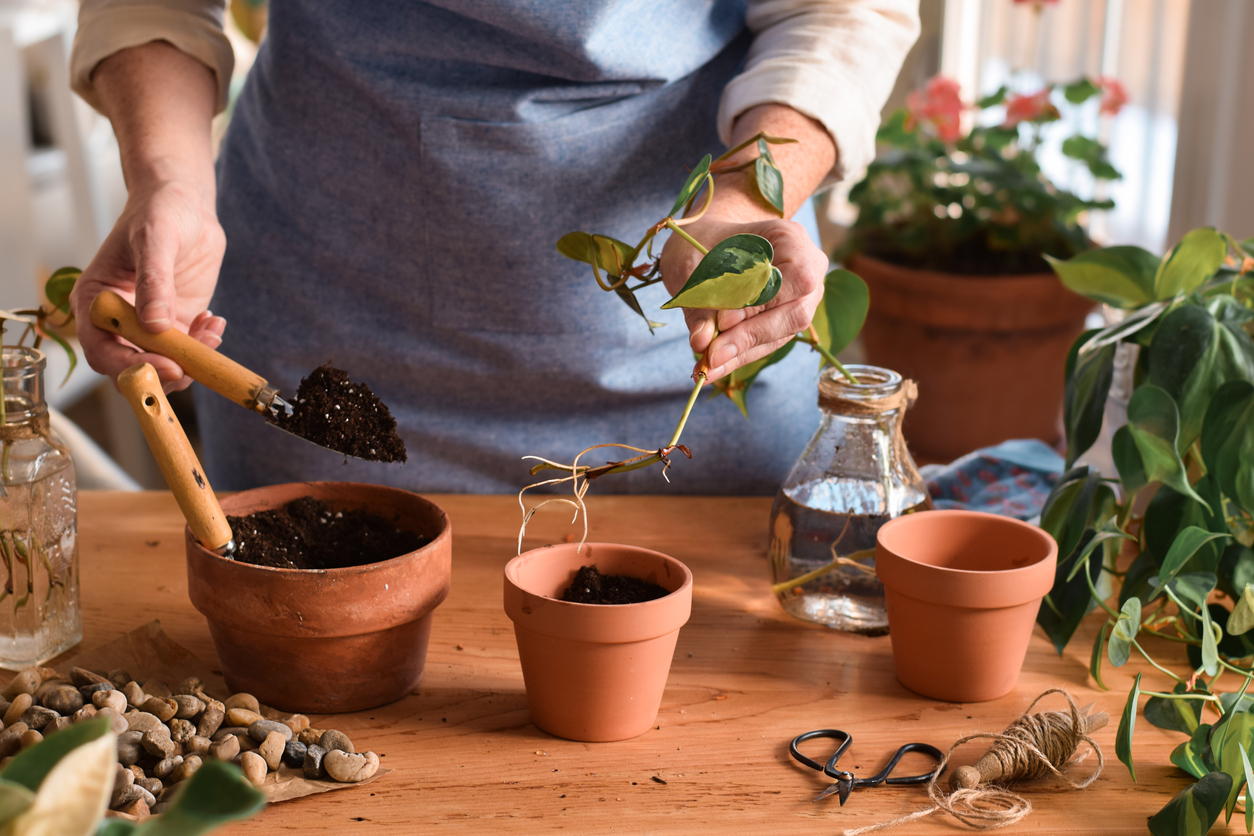
Choose whether you wish to grow the propagated plant in soil or water. After rooting out the cutting in one medium, it is difficult for it to transition to the other. Here is how to propagate pothos:
- Trim a 6-inch vine with four to six leaves and at least two nodes, cutting just above a leaf node.
- Strip off the lower leaves, leaving just the top two.
- For water propagation, place the lower half of the cutting into a water-filled vase, and place the vase in a warm, bright location.
- For soil-based propagation, insert the lower two nodes into a soil-filled pot. Moisten the soil and place the pot in a warm, bright location.
RELATED: 14 of the Fastest-Growing Houseplants for a Nearly Instant Indoor Garden
Types of Pothos Plant
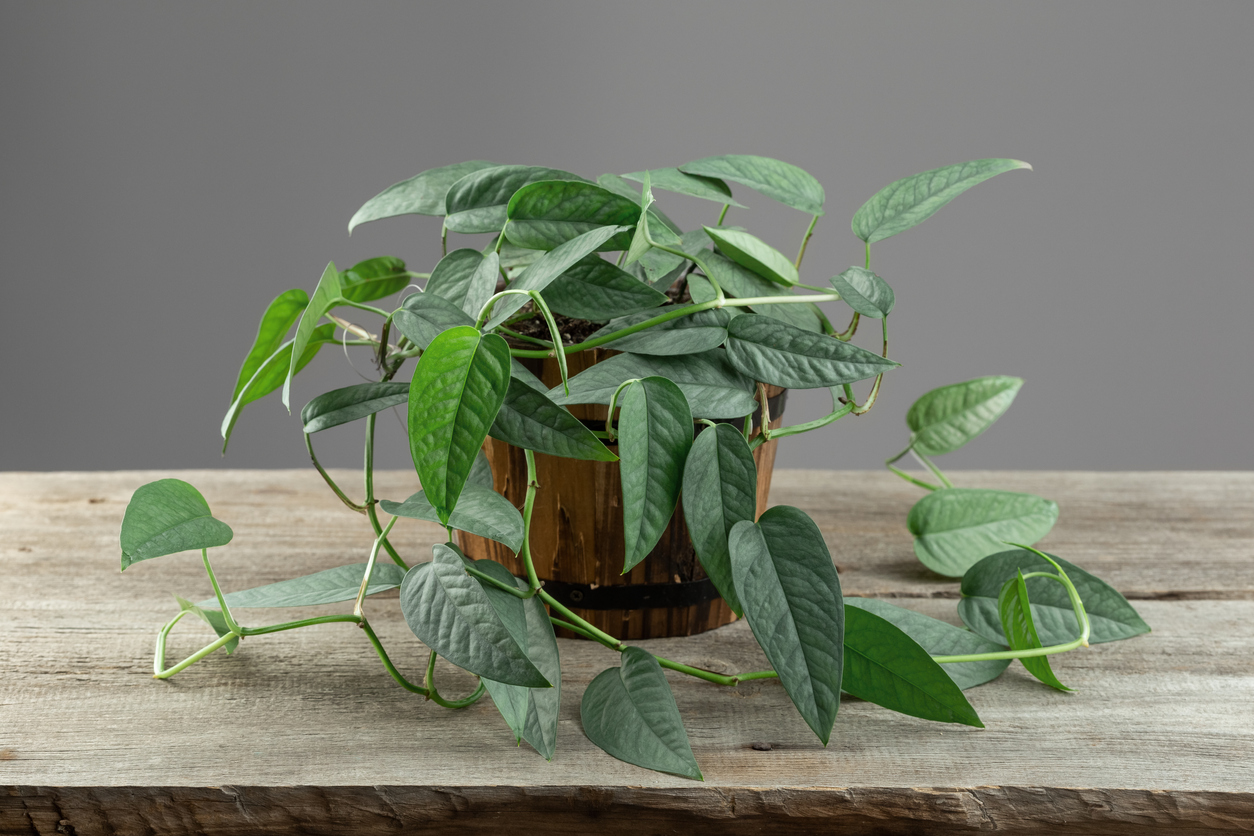
There are many different pothos varieties that make great houseplants. Here are some popular types of pothos plants.
- Golden Pothos (Epipremnum aureum): This traditional pothos features large green, heart-shaped leaves streaked with yellow variegation.
- Marble Queen Pothos (Epipremnum aureum ‘Marble Queen’): This is a popular cultivar with green heart-shaped foliage and creamy white variegation.
- Neon Pothos (Epipremnum aureum ‘Neon’): Featuring bright chartreuse leaves with no variegation, this pothos plant best showcases its color when given bright indirect light.
- Manjula Pothos (Epipremnum aureum ‘Manjula’): This pothos displays 4-color variegation, with silver, cream, white, and light green markings.
- Cebu Blue Pothos (Epipremnum pinnatum ‘Cebu Blue’): A true collectors’ cultivar, this pothos has deep blue-green, non-variegated leaves with a subtle metallic sheen.
- Pearls and Jade (Epipremnum aureum ‘Pearls and Jade’): This beauty features smaller green leaves than other pothos varieties, with white and green variegated patterns.
Safety Considerations
Pothos are mildly toxic to dogs, cats, and humans. They contain calcium oxalate raphides (needle-shaped crystals) that can act as an oral and digestive irritant, causing nausea or vomiting if ingested. They can also irritate your skin so wash your hands after handling pothos leaves, especially if you have sensitive skin.
Potential Pests and Diseases
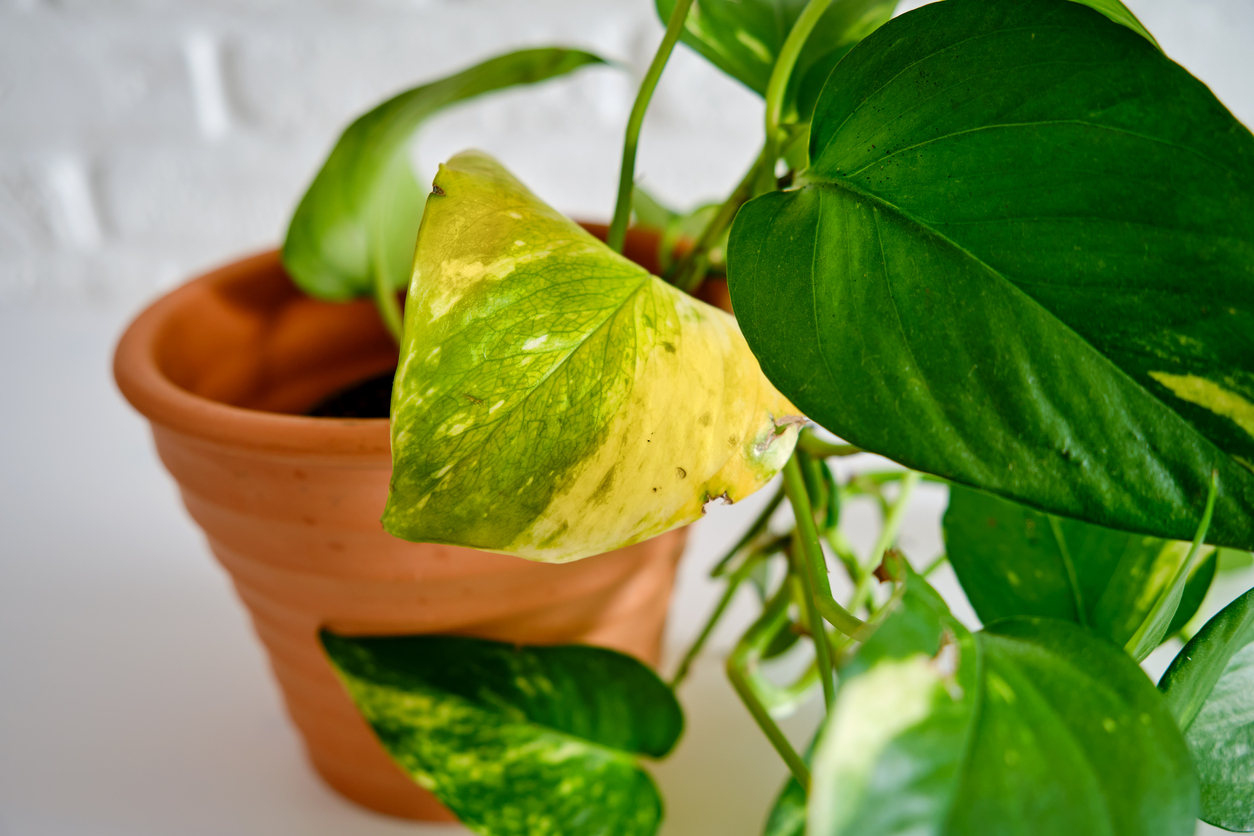
Easygoing pothos plants have no real insect pests, and only one potential disease issue. Phytophthora root rot is a soilborne fungus that infects plant roots. It is typically associated with wet soil and low oxygen levels that suffocate the roots. An infected plant typically shows wilting or yellowing leaves, even while the soil is moist, ultimately killing the plant. This problem is avoidable with well-drained potting soil and proper watering.
FAQs
Overwatering is the primary cause of yellowing leaves, so always ensure you’re using a pot with good drainage and letting the soil crust over somewhat between waterings. However, bacterial and fungal infections, as well as pest problems, can also cause yellow leaves.
Pruning your pothos regularly will stimulate new growth and fill it out. You can also insert a moss pole into the pot, which the pothos will climb with some training, growing fuller leaves to grab onto the pole. Plus, you can insert multiple pothos cuttings into one pot to create a fuller-looking plant.
Droopy leaves might be due to overwatering or underwatering, but pests, diseases, and lack of sunlight can also cause pothos plants to droop.
If you notice any roots sprouting out the bottom of the pot, or you have more roots than soil, it’s time to repot your pothos. Slow or stunted growth can also indicate that it’s time for a bigger pot.
